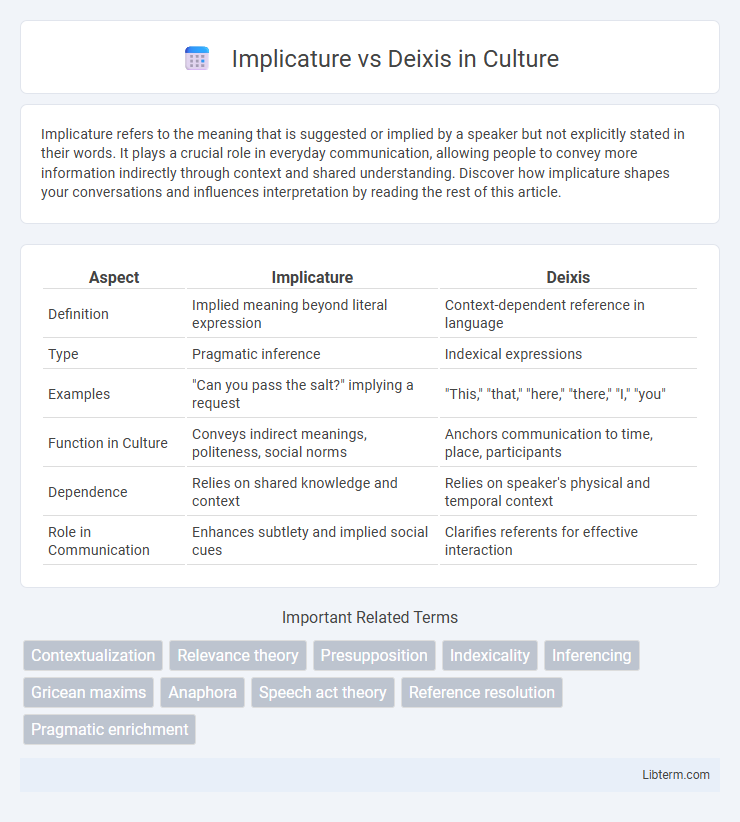Implicature refers to the meaning that is suggested or implied by a speaker but not explicitly stated in their words. It plays a crucial role in everyday communication, allowing people to convey more information indirectly through context and shared understanding. Discover how implicature shapes your conversations and influences interpretation by reading the rest of this article.
Table of Comparison
| Aspect | Implicature | Deixis |
|---|---|---|
| Definition | Implied meaning beyond literal expression | Context-dependent reference in language |
| Type | Pragmatic inference | Indexical expressions |
| Examples | "Can you pass the salt?" implying a request | "This," "that," "here," "there," "I," "you" |
| Function in Culture | Conveys indirect meanings, politeness, social norms | Anchors communication to time, place, participants |
| Dependence | Relies on shared knowledge and context | Relies on speaker's physical and temporal context |
| Role in Communication | Enhances subtlety and implied social cues | Clarifies referents for effective interaction |
Understanding Implicature: A Semantic Overview
Implicature refers to the implied meaning that goes beyond the literal expression in communication, relying on context and shared knowledge between speakers to convey information indirectly. It contrasts with deixis, which involves words or phrases like "this," "that," "here," and "now," whose interpretation depends strictly on the situational context of utterance. Understanding implicature involves analyzing conversational maxims and how speakers infer unstated intents based on cooperative principles in pragmatic linguistics.
Defining Deixis in Language Use
Deixis in language refers to words and phrases, such as pronouns and temporal or spatial expressions, that rely on context to convey meaning effectively. These deictic expressions require speaker, time, and place information to be correctly interpreted, as they point to aspects of the situational context. Unlike implicature, which involves inferred meaning beyond the literal, deixis is anchored in the immediate communicative environment.
Key Differences between Implicature and Deixis
Implicature refers to the implied meaning conveyed indirectly through context beyond the literal expression, relying on conversational maxims and shared knowledge. Deixis involves words or phrases, such as "this," "that," "here," and "there," whose meaning depends on the speaker's spatial, temporal, or personal context. While implicature requires inference to uncover unstated intentions, deixis requires contextual information to resolve reference and meaning within a specific communicative situation.
Types of Implicature: Conventional and Conversational
Implicature in linguistics divides into Conventional, where meaning is fixed by language conventions, and Conversational, which relies on context and shared knowledge for interpretation. Conventional implicatures include expressions like "but" and "therefore," signaling logical relations independent of context. Conversational implicatures, identified by philosopher H.P. Grice, arise from conversational maxims such as relevance and quantity, enabling listeners to infer implied meanings beyond literal utterances.
Categories of Deixis: Person, Place, and Time
Deixis categorizes references based on person, place, and time, which anchor utterances to the context of the speaker, listener, or discourse situation. Person deixis involves pronouns and forms indicating the participants (e.g., I, you, he), place deixis points to spatial locations relative to the speaker (e.g., here, there), and time deixis denotes temporal points or intervals (e.g., now, then). Unlike implicature, which relies on inferred meaning beyond literal expression, deixis depends on the immediate contextual framework for interpretation.
The Role of Context in Interpreting Implicature
Implicature relies heavily on contextual knowledge to derive meanings that go beyond the literal expressions, enabling listeners to infer speakers' intentions effectively. Unlike deixis, which depends on situational elements such as time, place, and speaker identity to interpret references, implicature requires understanding social norms, shared knowledge, and conversational maxims. This contextual sensitivity makes implicature a dynamic process, crucial for accurate communication in pragmatic analysis.
Contextual Anchoring in Deixis Interpretation
Deixis relies heavily on contextual anchoring to interpret expressions like "here," "now," and "you," which require situational information such as speaker location, time, and identity to convey meaning accurately. Unlike implicature, which depends on conversational context and inferred meaning beyond literal expression, deixis is directly tied to the physical and temporal setting of the utterance. Understanding deixis involves mapping linguistic elements onto specific contextual coordinates, making context indispensable for accurate interpretation.
Implicature vs. Deixis in Everyday Communication
Implicature and deixis function as essential pragmatic tools in everyday communication, where implicature conveys implied meanings beyond the explicit content, enabling speakers to suggest intentions or attitudes indirectly. Deixis, in contrast, relies on contextual references such as time, place, and person (e.g., "here," "now," "you") to ground utterances within the communicative situation. Understanding implicature versus deixis enhances interpretation accuracy by distinguishing between inferred meanings and situational anchors crucial for effective interaction.
Practical Examples: Implicature and Deixis Compared
Implicature often arises in conversations where a speaker implies meaning beyond the literal expression, such as saying "Can you pass the salt?" to request it rather than question ability. Deixis involves words like "here," "there," "you," and "me," which require contextual information to understand, as in "I am here now," where "here" depends on the speaker's location. Comparing the two, implicature relies on inferred meaning and shared knowledge, while deixis depends on situational context and speaker-listener positioning for interpretation.
Implicature and Deixis: Impacts on Semantic Analysis
Implicature involves implied meanings that go beyond the literal expression, affecting semantic analysis by requiring context-aware interpretation to infer speaker intent. Deixis relates to expressions whose meaning depends on contextual information such as time, place, and person, challenging semantic models to incorporate situational parameters for accurate understanding. Both implicature and deixis significantly impact semantic analysis by emphasizing the importance of pragmatic context in deriving meaning from utterances.
Implicature Infographic

 libterm.com
libterm.com